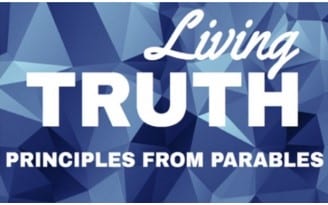
Matthew 21:33-46
October 8, 2023
Have you ever told a story or a joke to a group of people, but when you did not get the reaction you were hoping for, you decided to tell the story or joke later on to a different group of people hoping you would get a certain reaction from them? Jesus actually does this in our Gospel lesson for today as He tells a story to a group of people that was originally told by the prophet Isaiah, in our Old Testament lesson, 700 years earlier. This story was actually spoken by God through Isaiah with the hopes that it would get a group of self-centered people to turn from their sinful ways and follow God. But it did not work as the people rejected the warning in the story from Isaiah that God would destroy them if they did not worship Him and continued to worship other gods.
So in our Gospel text from Matthew, Jesus decides to tell this old story from Isaiah again hoping to get a different response from the people. Sadly, 700 years later, Jesus was dealing with another group of self-centered people who were worshipping other gods; but this story actually gives us a picture of how God sees and intercedes into the lives of selfish people who turn away from Him.
As Jesus told this story of a landowner who planted a vineyard on his property and rented the vineyard to some tenants to work it and care for it, many in the crowd who listened to Jesus thought the wicked tenants were the religious and political leaders of the day. Meanwhile, the religious leaders initially thought they were the landowners in the parable. And many Christians today may think they are the ones who will inherit eternal life once the landowner, meaning God, deals with those wicked tenants. But no one seems to see themselves as the wicked tenants. While Jesus told the religious leaders that they were the wicked tenants in the story, we cannot turn our backs on this story so easily thinking that we are the good guys.
In this story, the Jewish religious leaders believed that as God’s chosen people, who worked hard to keep His commandments, they were entitled to spend eternity with God in His heavenly kingdom. And they believed that with entitlements, once you get them, they cannot be taken away. But God didn’t see it that way. He had a different view of what people were really “entitled” to; and we see throughout the Bible how God works to change this attitude among people. Go back to the beginning, as Adam and Eve’s offspring began to populate the world, they became very selfish. They turned away from God and focused on themselves. So God sent a messenger, Noah, to warn the people to change their attitudes, but when the people refused to listen, God sent a flood to rid the world of this evil attitude – sparing only Noah and his family.
But as the years went by and Noah’s offspring populated the world, people again chose to turn away from God and toward their own sinful desires. As a punishment, God chose to have His people held in slavery by the Egyptians for over 400 years. God then sent another messenger, Moses, to lead them out of slavery to the Promised Land of Israel. As God brought them to Mount Sinai along the way and provided for their every need, Moses left them for 40 days to go up Mount Sinai to talk to God. And almost immediately the people went back to their old ways and turned away from God by creating a golden calf to worship in place of God.
Again, God’s people needed an attitude adjustment, so eventually God sent the prophet Isaiah to warn the people to change from their evil ways and to worship God only. He even told the people about a coming Savior who would sacrifice so much for so many, but his words just seemed to fall on deaf ears.
Finally, God sent His own Son, Jesus, to change the hearts and minds of the people of the world. He came with a message of grace, hope, peace, and forgiveness. He came to change the world and He told parables that explained the attitude changes that needed to take place and to restore the relationship between God and all people by His grace.
In each of these examples of attitude problems, the people believed they were entitled to more than what they had. Instead of thanking God for His gifts, they developed a selfish attitude and refused to listen. Instead of conforming their lives to the will of God, they wanted God to conform to their own sinful desires.
Today, it’s really not any different. We see people all around us who define God not by what He’s said about Himself, but by what they feel about Him. In other words, they try to redefine God by human standards rather than by His Word. Or, they like the parts in the Bible where God is merciful, but they want to ignore the parts where He is a God of justice. Breaking God’s laws requires punishment and we are the law breakers. We have sinned against God and that demands a sentence. And that sentence we have earned is eternal separation from God. This is our real “entitlement.”
The tenants of the vineyard owed rent to the owner. They worked in the vineyard and were to give a portion of their fruit to the owner, but they did not like those rules. So they made their own set of rules and rebelled against the agreement the owner had with them. They felt entitled to everything, and were not willing to give what was due to the owner.
Just like those tenants, many people today do the same thing. They fail to recognize that God is the owner of this world and everything we have is a gift from God. We are not entitled to anything and yet God, in His grace, gives us His very best – He gives us everything to enjoy.
The amazing thing about this story is how Jesus asks the religious leaders what they think the landowner should do to the tenants. And they reply in verse 41 saying, “He will put those wretches to a miserable death and let out the vineyard to other tenants who will give him the fruits in their seasons.” But that’s not what God did. When faced with rebellious tenants, He does not do the logical thing – that being throwing the tenants out of the vineyard or even killing them for their arrogance – instead He sends His Son to show grace and mercy. It is truly mind- boggling that God would send His Son into the world after He had seen how His people treated His messengers and prophets. And yet, Jesus spoke these words a few days after Palm Sunday, knowing He was going to die in less than a week, but He still tries to save these people by telling this old story to get them to change their ways. Sadly, they did not change as we see the same ending to this story as the first time it was told.
So now the question is: Will this old story bring a new ending as it is told again today? Like God’s people during the days of Isaiah in the Old Testament and Jesus in the New Testament, we, too, have been placed in God’s vineyard and He provides us with everything we need to grow and bear fruit. Namely, He gives us His Word and His Sacraments of Baptism and Communion to forgive our sins and strengthen our faith. And this Word of God reminds us that as His tenants, we have the responsibility to take what God abundantly supplies to us and we are to use it to meet the needs of a hurting and selfish world. And then as we gather together as God’s church right here every week, we celebrate those blessings and offer back to God a portion of what He has given to us – ourselves, our time, and our possessions, signs of His gracious love.
All of this is what Jesus, God’s Son, came to nurture in us. But, too often, we fall into the same tragic ending of the old parable as it was told during the days of Isaiah and Jesus. We show ourselves to be unfaithful tenants of God’s world whenever we do not demonstrate love toward God and our neighbors. Such sin makes us deserving of losing the gift of heaven and being put to eternal death. But while we are not entitled to anything from God, He still sent His Son, Jesus, to save the vineyard, meaning the world, and its tenants – all of us.
Jesus calls us to live for Him, and we are blessed today that Jesus still comes to us through His Word and Sacraments to forgive us. Therefore, let us all be the new ending of this old parable as we share the blessings that God provides for us, as we grow in His Word through worship and Bible study, and as we walk with His Son, Jesus, who comes to give us life, on a daily basis.


